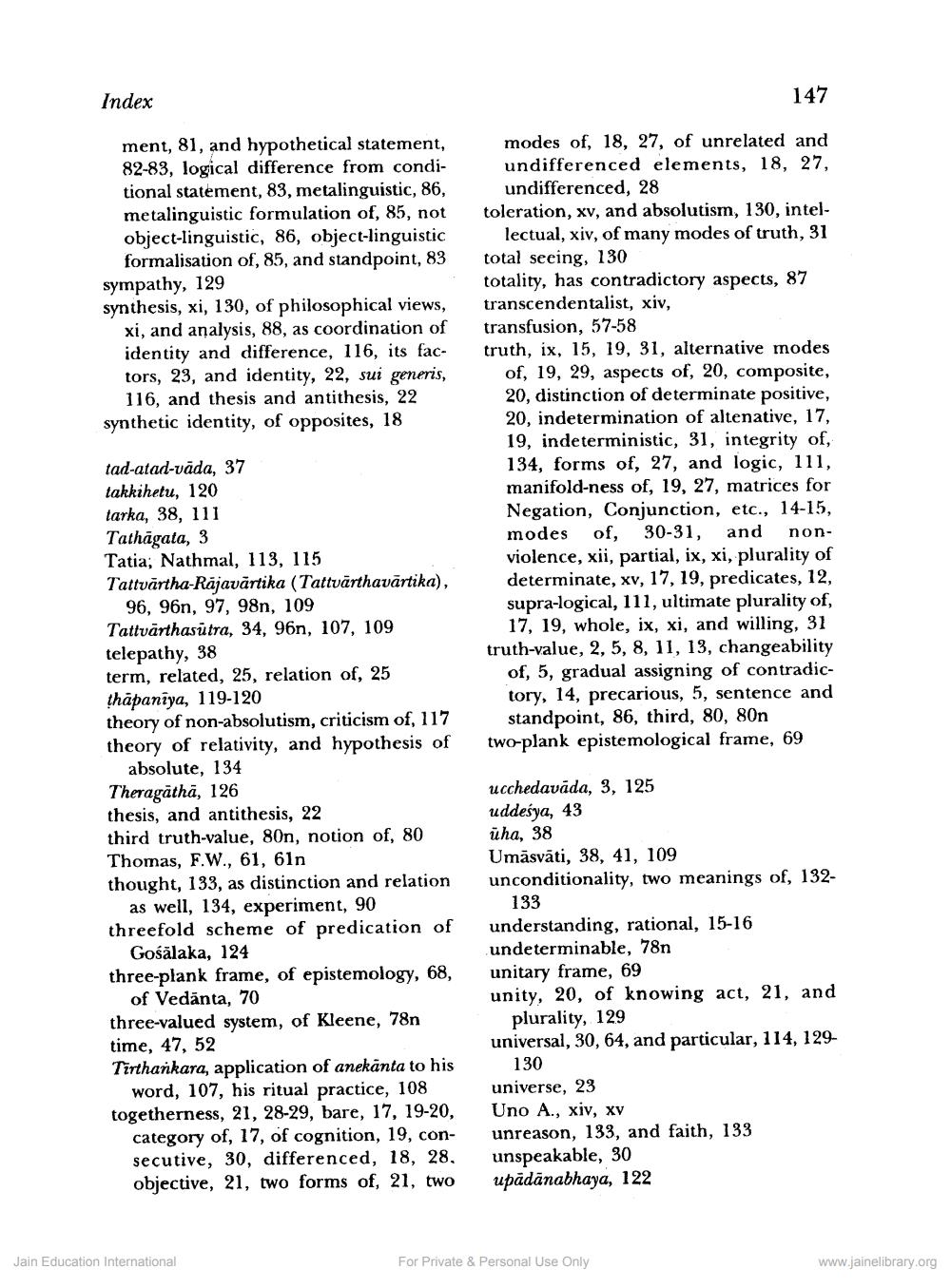________________
Index
147
ment, 81, and hypothetical statement, 82-83, logical difference from conditional statement, 83, metalinguistic, 86, metalinguistic formulation of, 85, not object-linguistic, 86, object-linguistic
formalisation of, 85, and standpoint, 83 sympathy, 129 synthesis, xi, 130, of philosophical views,
xi, and analysis, 88, as coordination of identity and difference, 116, its fac- tors, 23, and identity, 22, sui generis,
116, and thesis and antithesis, 22 synthetic identity, of opposites, 18
modes of, 18, 27, of unrelated and undifferenced elements, 18, 27,
undifferenced, 28 toleration, xv, and absolutism, 130, intel
lectual, xiv, of many modes of truth, 31 total seeing, 130 totality, has contradictory aspects, 87 transcendentalist, xiv, transfusion, 57-58 truth, ix, 15, 19, 31, alternative modes
of, 19, 29, aspects of, 20, composite, 20, distinction of determinate positive, 20, indetermination of altenative, 17, 19, indeterministic, 31, integrity of, 134, forms of, 27, and logic, 111, manifold-ness of, 19, 27, matrices for Negation, Conjunction, etc., 14-15, modes of, 30-31, and nonviolence, xii, partial, ix, xi, plurality of determinate, xv, 17, 19, predicates, 12, supra-logical, 111, ultimate plurality of,
17, 19, whole, ix, xi, and willing, 31 truth-value, 2, 5, 8, 11, 13, changeability
of, 5, gradual assigning of contradictory, 14, precarious, 5, sentence and
standpoint, 86, third, 80, 80n two-plank epistemological frame, 69
tad-atad-vāda, 37 takkihetu, 120 tarka, 38, 111 Tathāgata, 3 Tatia; Nathmal, 113, 115 Tattvārtha-Rajavārtika (Tattvārthavārtika),
96, 96n, 97, 98n, 109 Tattvärthasutra, 34, 96n, 107, 109 telepathy, 38 term, related, 25, relation of, 25 thāpaniya, 119-120 theory of non-absolutism, criticism of, 117 theory of relativity, and hypothesis of
absolute, 134 Theragathā, 126 thesis, and antithesis, 22 third truth-value, 80n, notion of, 80 Thomas, F.W., 61, 61n thought, 133, as distinction and relation
as well, 134, experiment, 90 threefold scheme of predication of
Gośālaka, 124 three-plank frame, of epistemology, 68,
of Vedānta, 70 three-valued system, of Kleene, 78n time, 47, 52 Tirthankara, application of anekānta to his
word, 107, his ritual practice, 108 togetherness, 21, 28-29, bare, 17, 19-20,
category of, 17, of cognition, 19, consecutive, 30, differenced, 18, 28, objective, 21, two forms of, 21, two
ucchedavāda, 3, 125 uddeśya, 43 üha, 38 Umāsvāti, 38, 41, 109 unconditionality, two meanings of, 132
133 understanding, rational, 15-16 undeterminable, 78n unitary frame, 69 unity, 20, of knowing act, 21, and
plurality, 129 universal, 30, 64, and particular, 114, 129
130
universe, 23 Uno A., xiv, xy unreason, 133, and faith, 133 unspeakable, 30 upādānabhaya, 122
Jain Education International
For Private & Personal Use Only
www.jainelibrary.org




